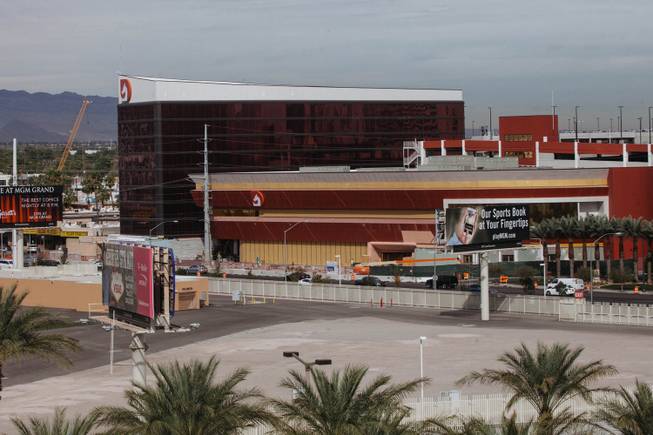Thursday, Oct. 20, 2016 | 3:31 p.m.
Related Covrage
The Lucky Dragon, the first ground-up casino built near the Las Vegas Strip in several years, won final approvals from the Nevada Gaming Commission today.
The resort, scheduled for a Dec. 3 opening, sits near the corner of Las Vegas Boulevard and Sahara Avenue.
Lucky Dragon general manager Matthew Harkness said the resort will market to domestic Asian customers in Las Vegas and Southern California and also in the Pacific Northwest and Vancouver, British Columbia. “Only approximately 10% of the revenue will be coming from overseas customers,” Harkness said.
Still, that last 10 percent prompted Commissioner Philip Pro to ask about the resort’s plans to market to mainland Chinese customers.
It was a timely question, given that two Australian casino executives were recently detained in China allegedly in connection with attempts to lure Chinese high-rollers to their casinos and possibly violating mainland China’s strict laws governing the marketing of gambling.
“With regards to marketing overseas, how are you going to be marketing to mainland China as an example?” Pro asked. “Will those players be hosted by junket reps?”
“That would be the process,” Harkness said. ”Approved junkets. That is the process which I’m sure you’re familiar with and one we will follow. We will follow those rules. We have processes in place ensuring all those regulations and rules are followed.”
Discussion then turned to the resort’s use of EB-5 financing.
The EB-5 Immigrant Investor Program, administered by the U.S. Citizenship and Immigration Services department, provides visas to foreign nationals who invest in businesses that create or preserve 10 permanent full-time jobs. The SLS Las Vegas, just down the street from the Lucky Dragon also benefited from EB-5 financing.
Specifically, Pro asked Lucky Dragon COO David Jacoby if the investors were guaranteed a visa by investing in the resort.
“There is no guarantee,” Jacoby said. “It’s expressly written in the structure of the EB-5 law. Each investor is at risk. Either at risk to not meet their immigration goals or their investment goals. Both are not guaranteed.”
The commissioners also asked Jacoby if the EB-5 investors would have any influence on casino operations. He replied that they would not and are, in effect, silent investors.
The commission unanimously approved the Lucky Dragon’s gaming license, licensure for Jacoby and Harkness and Vice President of Finance Shaza Sattar as key employees, and other applications related to trusts and the ownership of the casino.
The commission later turned its attention to the proposed changes to gaming regulations intended to promote new casino games.
The changes would amend Regulation 14 to create a New Innovation Beta process, in which new games can be brought to the casino floor and tested with real customers before all the regulatory standards have been met.
A.G. Burnett, chairman of the Gaming Control Board, the body that helped develop the regulation changes and is charged with enforcing them, said the idea was “to loosen up where we can but keep our gold standard in place.”
James Barbee, chief of the Gaming Control Board’s technology division, said a limited loosening of rules was permissible to promote innovation.
“We’re not willing to take a risk on matters of patron protection,” Barbee said. “But I believe the industry as well as technology has advanced to the point where we can assume a bit more risk in terms of regulatory compliance.
“Yes, we are accepting certain amount of risk but we are looking to have some compensating controls to mitigate that. I do think it’s seminal as far as how we regulate and how the regulation does give the industry the ability to deploy products that much quicker and get patrons’ acceptance that much quicker.”
If the rules changes and decline in gambling revenue aren’t enough incentive, comments during the hearing from Commission Chairman Tony Alamo, might perk some ears in the gaming industry.
After speaking about his experience at the Global Gaming Expo earlier this fall, where he played the skill-based game Into the Dead for two hours, Alamo complained about the pace of change.
“I would tell you, from the bigger companies, I just don't see products yet,” Alamo said.
Dan Reaser, who was at the hearing representing the Association of Gaming Equipment Manufacturers, the trade group that helped develop the new regulations, said that would change after the new regulations are in place.
“I could be wrong,” Reaser said. “But it’s probably one of those things where there’s a lot of R & D going on and there will be a floodgate.”
Alamo then asked Barbee, whose technology division is heavily involved in reviewing new casino games, how many new products he’s seeing.
I wouldn’t say we have anyone beating down our door or worrying about being the last one in in line,” Barbee said. ”There are definitely products in the pipeline. But we’re also not seeing a mad rush.”
The commission unanimously approved the new regulations which went into effect immediately.
CORRECTION: An earlier version of this story did not include the full name of the Association of Gaming Equipment Manufacturers. | (October 21, 2016)


Join the Discussion:
Check this out for a full explanation of our conversion to the LiveFyre commenting system and instructions on how to sign up for an account.
Full comments policy